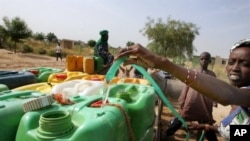Before next week's Millennium Development Goal Summit in New York, Senegal is being noted for its significant progress in improving access to clean drinking water.
U.N. officials from around the world will meet in New York next week to discuss the Millennium Development Goals. U.N. officials and workers in the world's poorest countries hope to meet the goals by 2015.
Among the goals is to halve the number of populations who suffer from lack of access to safe drinking water by 2015.
Senegal made good progress toward this goal and by 2006, 93 percent of people living in the country's cities had access to improved water.
UNICEF adviser for water, hygiene and sanitation in West and Central Africa, Chris Cormency, said Senegal has taken a proactive role in bringing clean drinking water to its population.
"They have really done some innovative things in Senegal for water," said Cormency. "Well I think one of the things they have done is they have sort of tied in some of the new IT initiatives, cell phones into their monitoring, so they are able to keep really high functioning rates of their water points. Because they have set up systems that at the village level can be used to transmit information on a broken pump for example."
He added programs like these are initiatives that can be duplicated in the region - an act that is needed, because the West and Central African region as a whole is still lagging behind the goal.
"We have a situation where we have no country in the region on track to reach the MDG for sanitation," added Cormency. "And we have seven countries out of the 24 that are on track to reach the MDG for water."
Bringing clean water to both rural and urban populations is an essential goal that is intertwined with the others for education, health and more, says Cormency.
"When we talk about access to water. We talk about a lot of things. Water and sanitation it is about increasing health. It is about having access. It is about having gender equality. It is about increasing access to education. They are all interlinked. So when we do not have a water supply that is clean and that is close to a village, let us say. The villagers will first have high rates of diarrhea, and we know that diarrhea is one of the top three child killers globally," noted Cormency.
Cormency added that though Senegal has made significant progress, people in rural areas are five times less likely to have access to clean drinking water than those living in urban areas.
Senegal Using Technology to Ensure Greater Access to Clean Water











